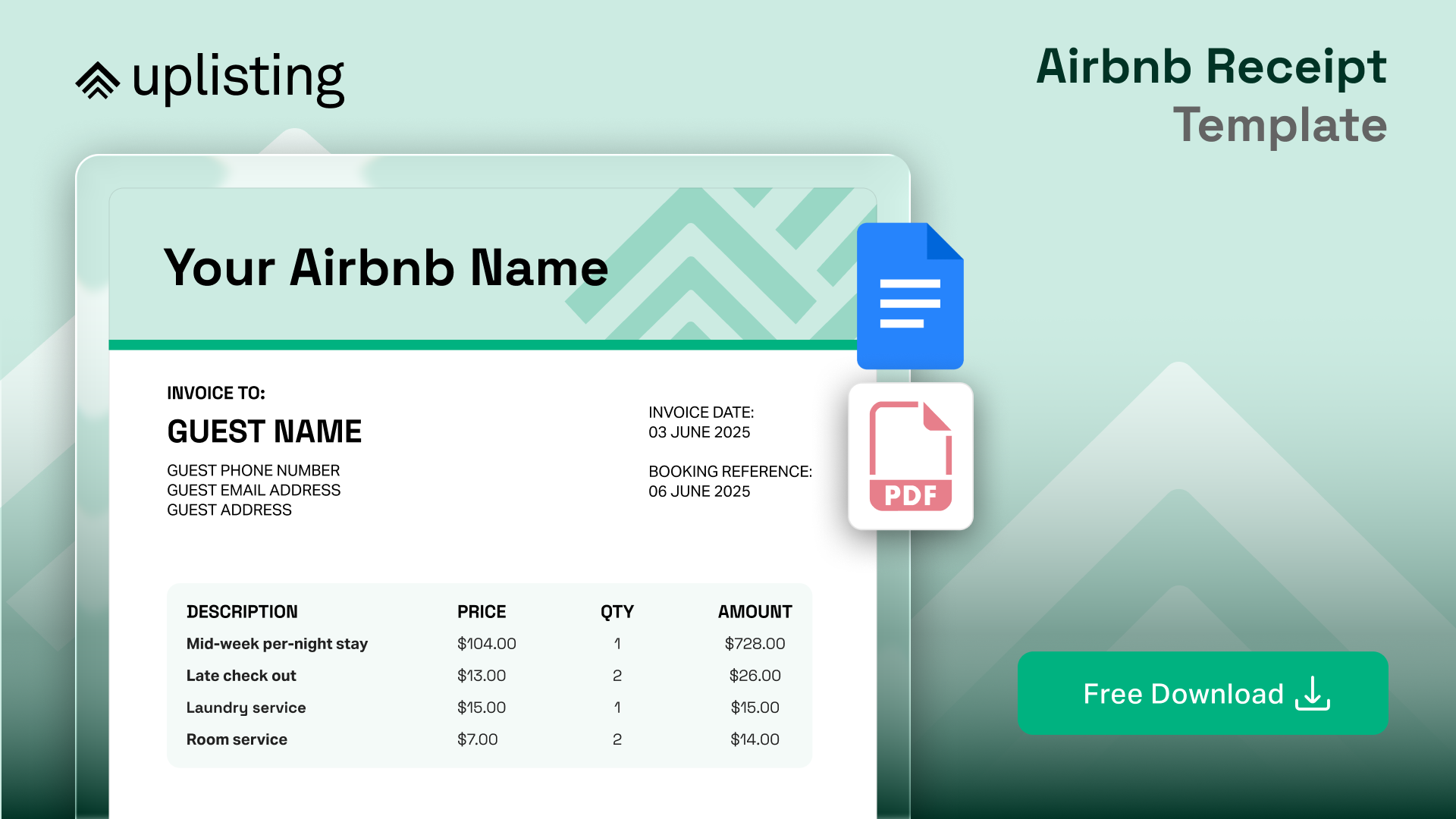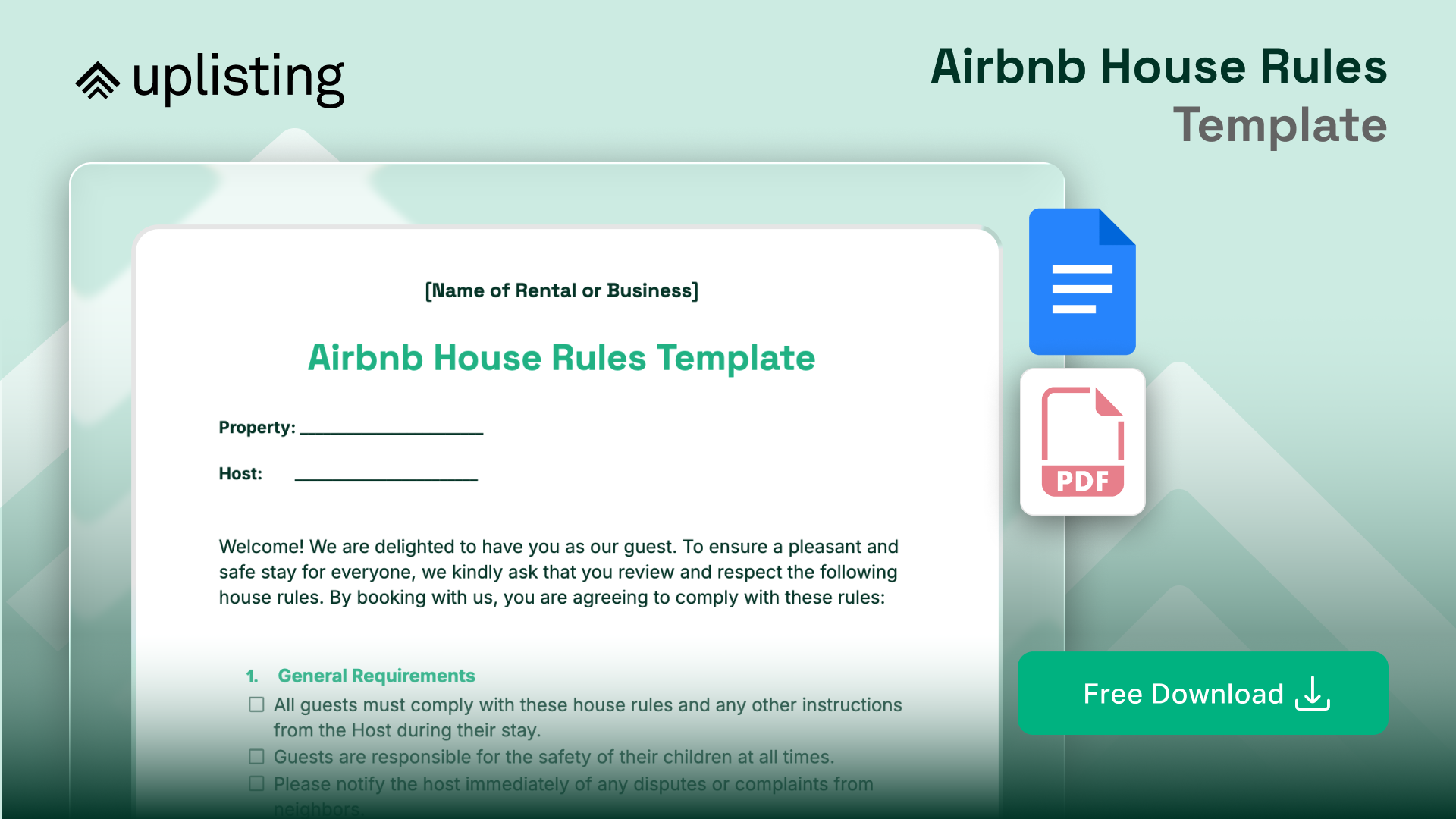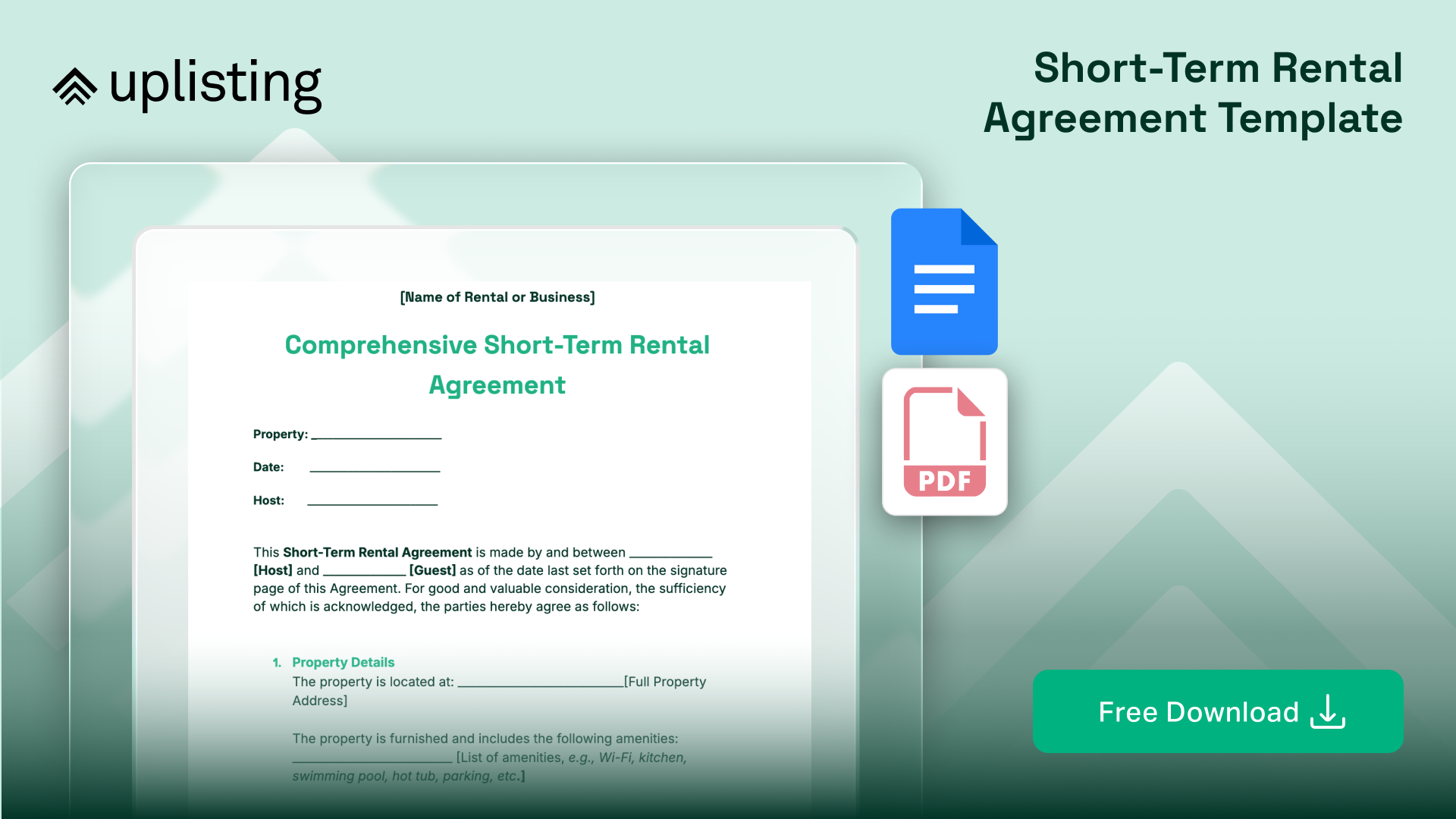Key Takeaways
Airbnb concierge services handle tasks that make hosting easier and guest stays smoother.
They can be tailored to fully manage a property or support only specific aspects of hosting.
Understanding the scope, cost and benefits helps hosts decide if it’s the right fit.
Imagine a guest arriving at your short-term rental after a long day of travel to find dinner reservations already made, a fridge stocked with their favourite snacks, and a private tour scheduled for the next morning. That's the dream, right!
Well, that’s the kind of experience an Airbnb concierge service is designed to create.
An Airbnb concierge service offers guests personalised support before, during, and sometimes after their stay, taking care of the details that make a trip more enjoyable. For hosts, it’s a way to deliver a premium experience without being on call for every request. From arranging transport and booking activities to handling mid-stay cleaning or special requests, concierge services can elevate both guest satisfaction and your property’s reputation.
This article unpacks what an Airbnb concierge service really does, how it fits into vacation rental property management and when it makes sense to hand off certain tasks.
What an Airbnb Concierge Service Does
An Airbnb concierge service takes care of the guest-facing side of hosting, without pulling you away from higher-level work. While property management keeps the building running and the calendar full, concierge teams step in to handle guest needs, from arrival to check-out. The focus shifts from the property itself to the people staying in it.
Concierge providers handle personalized check-ins, local recommendations, mid-stay cleaning, and replenishing household supplies. Some also arrange grocery delivery before arrival, coordinate airport pickups, or manage key exchanges in person. The guest walks into a warm, stocked space with everything in place, and that kind of setup builds trust right away.
Concierge support differs from property management in how it shows up for each booking. A property manager might adjust your pricing strategy or schedule a contractor, whereas an Airbnb concierge makes sure the lights are on, the fridge has oat milk instead of dairy, and the guest knows the best local pizza spot without having to ask.
Here’s how the roles stack up:
Property management: Covers bookings, maintenance, payment processing, and compliance.
Concierge service: Handles guest experience, comfort, logistics, and in-person requests.
Adding a concierge layer doesn’t mean rebuilding your entire operation. It means having someone local who handles the human side, while you stay focused on scaling without sacrificing quality.
So automatic, you won’t know what to do with yourself
Put my rentals on autopilot
It’s simple to automate repetitive tasks with Uplisting's short-term rental software. You’ll save hours every week and eliminate human error. Go ahead — take some time off.
Types of Airbnb Concierge Services
Airbnb concierge services come in different shapes depending on how much support you need and how hands-on you want to be. Some services take over the entire guest experience while others fill in gaps where your time or staff can’t stretch.
Full-service concierge
A full-service concierge handles nearly every guest-facing and operational task you’d normally cover. That includes pre-arrival coordination, guest messaging, key handovers, mid-stay cleanings, restocking supplies, and check-out walkthroughs. Some even track reviews and follow up with guests post-stay.
This option makes sense when you’re managing remotely or expanding faster than your current systems can support. You still control your listings, but a local partner handles hospitality from start to finish so you don’t have to.
Task-specific concierge
Not every host needs full coverage. Task-specific concierge services offer a pick-and-choose model. You stay in charge while offloading the jobs that slow you down.
Check-in and key exchange: A local professional meets guests, confirms ID, and walks them through the space.
Pre-stay stocking: Groceries, toiletries, or custom requests are delivered and set up before guests arrive.
Guest support on demand: Help is available locally for those guest messages like lost keys, last-minute needs, or neighborhood questions.
Mid-stay or post-stay cleaning: Cleaners are scheduled and managed without your direct involvement.
This type of support works well when you want to stay close to guest communication but need help on the ground where your time can’t reach.
In-person vs. remote concierge
In-person concierge services rely on local experts; co-hosts, hospitality staff, or vetted third parties. They’re a good fit for homes where guests expect a high-touch experience, or where automated systems can't cover everything. A real person shows up, hands over the keys, and solves problems on the spot.
Remote concierge services handle guest logistics online. Messaging, virtual check-ins, and digital troubleshooting all run without anyone physically present. Remote teams often cost less and scale more easily, especially for city listings with self-check-in setups.
Choosing between in-person and remote depends on your property type, guest expectations, and how much you want to delegate. A walk-up apartment with smart locks might only need remote support. A large home outside the city? Probably better with someone local to manage what can’t be done from a screen.

Benefits of Using an Airbnb Concierge Service
Scaling a short-term rental business means juggling more tasks than anyone wants to admit. Guest messages, sudden cleaning issues, and last-minute supply runs can pile up fast. An Airbnb concierge service takes those operational chores off your plate so you can focus on growing listings, keeping owners happy, and staying ahead of competitors.
Less stress, more time to scale
Every minute spent coordinating a key handoff or answering a late-night lockbox question is time pulled away from revenue-driving work. A concierge team handles guest logistics and on-the-ground coordination, freeing you up to monitor portfolio trends, adjust pricing, or onboard the next property without pausing to find a cleaner.
The shift is immediate: fewer interruptions, smoother workflows, and less mental clutter.
Uniform guest experience across every listing
Consistency is hard when listings are scattered across different neighborhoods or markets. Guests still expect the same level of service, no matter where they stay. Concierge providers follow established check-in, cleaning, and communication protocols that standardize the experience from one property to the next.
Reliable routines mean fewer slip-ups. When every property runs the same way, guests know what to expect—and so do you.
Better reviews and higher retention
Guests notice when the lights are on, the space smells fresh, and the check-in process feels smooth. They also notice when no one answers a late-night message or when the promised coffee isn’t stocked. Concierge support closes the gap between what guests hope for and what they actually get.
The result? Higher ratings, more five-star reviews, and better odds of repeat bookings. A clean, well-prepared space backed by responsive support keeps guests coming back; and telling their friends.
Local knowledge that adds real value
Concierge teams based near your properties bring in-depth area knowledge that goes beyond Google searches. They know which vendors show up when they say they will, which restaurants deserve a mention, and which city inspectors care about minor infractions.
Faster problem-solving: Local teams step in quickly when something goes wrong.
Smarter guest suggestions: Restaurant or activity recommendations feel personal, not copy-pasted.
Less compliance risk: Some concierge providers track local rules and flag updates before they become problems.
Instead of trying to manage every detail from a distance, you can rely on people who already know the terrain. That kind of support makes your listings sharper, your operations tighter, and your days easier.
You’re in great company
Sign up
Some of the largest short-term rental operators (with 250+ properties) rely on Uplisting's software to scale their businesses.
How Airbnb Concierge Services Work in Practice
Think of an Airbnb concierge service as the crew behind the curtain—quiet, efficient, and making sure everything goes right without needing the spotlight. For property managers juggling multiple listings, the real value shows up in how seamlessly concierge providers fit into day-to-day operations. They don’t just pick up tasks—they bring structure that scales without chaos.
Step-by-step workflow from setup to service
Everything starts with onboarding. Once a concierge partner comes on board, the first step is understanding the layout, guest expectations, and what the host wants covered. A walkthrough (either virtual or in person) usually follows. From there, the team builds a checklist that covers inventory, access instructions, emergency contacts, and guest preferences.
Then comes the service outline. The provider defines exactly what they’ll handle: pre-arrival prep, guest communication, cleaning cycles, supply restocking, and urgent fixes. Each task gets tied to a specific moment in the guest journey, so nothing falls through the cracks. Property managers with multiple units benefit most here, one clear system keeps every listing on track.
Once the setup is complete, the team shifts into steady execution. They sync with the booking calendar and work off triggers tied to reservation status. A confirmed booking kicks off pre-arrival prep. Check-in day prompts a warm welcome and key access instructions. Check-out means swift cleaning and a full reset before the next guest.
Communication flow between host, concierge, and guest
Clear lines of communication make the system work. Concierge setups rely on consistent messaging between three key roles: host, concierge, and guest. Each one knows who handles what and how to flag issues before they snowball.
Host to concierge: Any property updates, guest details, or special requests move through a single shared channel, so no chasing down texts or missed calls.
Concierge to guest: Messages feel personal, not robotic. Guests get timely notes before arrival, clear check-in instructions, and helpful tips during their stay, typically through Airbnb’s messaging system to keep everything transparent.
Concierge to host: Updates arrive as needed. That includes check-in confirmations, issue reports, supply shortages, and cleaning logs, usually through email summaries or a shared dashboard.
The setup keeps everyone in the loop without constant back-and-forth. It’s smooth, predictable, and easy to manage even when properties span different cities.
Tailoring services to different properties
Every property needs its own playbook. A downtown studio with smart locks doesn’t run the same way as a five-bedroom home on a rural lot with a fireplace and high-maintenance landscaping. Service adjustments matter... And good concierge teams know how to adapt.
Take a short-stay unit near a business hub. Quick turnovers and automated check-ins might be all that’s needed. Now compare that to a luxury rental designed for weeklong family vacations. That space might call for grocery stocking before arrival, extra towels and bedding, in-person greeters, and even crib setup.
Instead of a fixed checklist, the best concierge services create flexible routines that support how the property actually runs. That kind of structure keeps bookings smooth, even when the calendar fills faster than expected.
What to Consider Before Hiring a Concierge Service
Not every concierge provider fits every short-term rental business. The wrong setup drags down efficiency, eats into margins, and leads to inconsistent guest experiences. Before bringing a new team into your operation, take time to understand how they work, what they charge, and whether they make your life easier—or harder.
Understand how pricing affects your margins
Most concierge teams charge either a flat monthly fee per listing or take a percentage from each booking. Flat-rate pricing offers stable costs, ideal when occupancy stays strong across the calendar. A commission-based model, on the other hand, might work better in areas with seasonal swings or uneven demand.
Keep an eye on fees that creep above 12–15%. For properties with high ADR, that might be manageable. For city apartments with fast turnover, it can quickly eat into profit. Ask for a breakdown of what’s included. Cleaning coordination? Guest messaging? Emergency visits? Every service should be clearly listed, not bundled into vague packages.
Evaluate consistency, not just promises
A missed check-in or late cleaner doesn’t just frustrate guests; it tanks reviews and chips away at your listing’s visibility. Instead of asking what the service offers, ask how it delivers reliably, every time.
Staffing model: Are the same people showing up for each job, or is it whoever’s available?
Response time: Can someone meet a guest within 30 minutes if there's an issue, including on weekends?
Workflow: Do they follow checklists or just play it by ear?
Without clear systems for day-to-day operations, service levels vary—and that becomes your problem when ratings drop.
Local knowledge isn’t optional
Short-term rental rules change fast. Noise limits, guest caps, tax requirements, signage laws; they’re different across cities and often shift without much notice. A concierge team without local experience might miss small details that lead to big issues down the line.
Ask how they stay current. Do they track licensing deadlines? Notify you of any updates tied to your locations? A hands-on team flags compliance gaps before they affect bookings or open the door to fines.
Don’t skip the reputation check
Surface-level praise doesn't tell you much. Look for feedback that explains how the service improves operations: faster turnovers, better guest reviews, fewer cancellations. Case studies from hosts with similar portfolios (same unit size, turnover rate, or market) give the clearest picture.
Reach out to current clients when you can. Ask how long they’ve worked with the concierge team, how they handle problems, and whether their workflows are predictable. A polished sales pitch doesn’t matter if the follow-through is patchy after onboarding.
Create 5-star guest experiences
Give your guests unforgettable experiences
With Uplisting, you can send the right messages at the right time on all booking sites. Read and respond to guest messages in a single, unified inbox — whether you’re at the office or on the go.
Uplisting Helps You Run Your Airbnbs with Ease
Airbnb concierge services offer short-term rental operators a practical way to deliver consistent, high-quality guest experiences without adding operational strain. Whether you need full-service support or targeted help with guest logistics, concierge teams can step in to handle the details, so you can focus on scaling, acquiring new properties, and increasing profitability.
Understanding how concierge services fit into your workflow helps you make smarter decisions about where to delegate and where to stay hands-on. With the right local partner, you can streamline check-ins, boost reviews, and maintain property standards across your portfolio, while reducing stress and saving time.
If you're ready to take control of your short-term rental operations and automate what matters most, sign up for Uplisting to streamline your vacation rental management. With built-in automation, unified messaging, and tools that scale with you, Uplisting gives you the operational clarity you need to grow with confidence.
FAQs About Airbnb Concierge Service
Can a concierge service run my whole Airbnb business?
Not entirely, but it can take a major load off your plate.
A concierge team can manage check-ins, schedule cleanings, stock supplies, handle guest issues, and coordinate local vendors. You still need to lead pricing strategy, oversee compliance, communicate with owners, and set the standards that keep operations consistent across every unit.
It’s support, not a replacement. Think of the concierge role as your on-the-ground partner; keeping things smooth while you focus on scaling.
Is it expensive to hire a concierge for multiple properties?
Costs usually scale with service level and property count. Most providers charge a flat monthly fee or take a cut of each booking. If you manage a growing portfolio, many offer bulk pricing. That can bring the per-property cost down fast.
What matters more is what you get back; time, fewer errors, better reviews, and less stress. If a concierge team helps you turn over units faster and keeps guests happy, the return often outweighs the spend.
Does Airbnb allow external concierge providers?
Yes, with a few clear rules. Airbnb lets hosts work with third-party providers, including concierge teams, as long as all communication with guests stays on Airbnb and any extra fees show up in the listing.
Hosts using Airbnb’s co-host system can connect directly with vetted partners. If you’re bringing in outside help, make sure they follow the guidelines. The platform expects everyone involved to keep things clear and transparent.


















.png)

